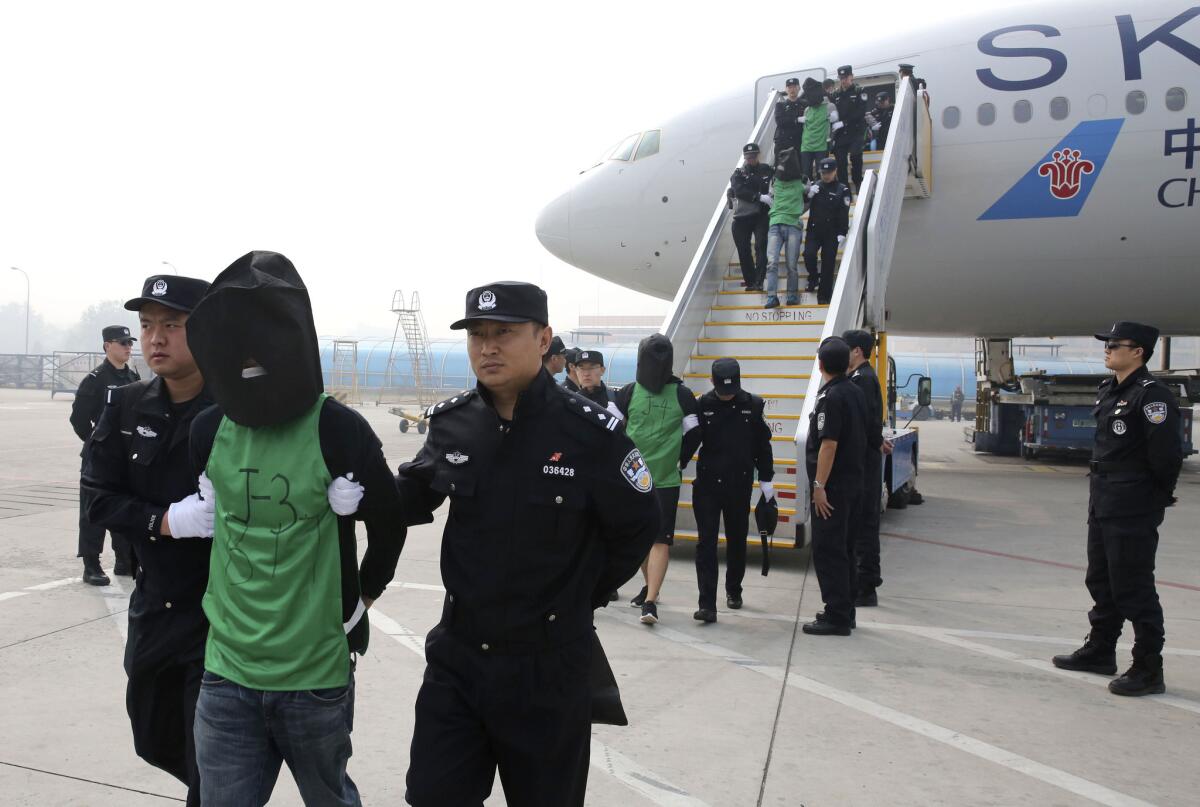Taiwan accuses China of abducting its citizens

Chinese and Taiwanese citizens who were deported from Kenya arrive at Beijing Capital International Airport on April 13, 2016. The move focuses new attention on Beijing’s willingness to assert its sovereignty claim over the Taiwan, and the leverage it wields over smaller nations in backing that position.
- Share via
reporting from taipei, taiwan — Taiwanese officials have accused Beijing of “abducting” its citizens after Kenya deported 45 Taiwanese prisoners back to the mainland this week in an incident that has raised tension in an already-fraying cross-strait relationship.
Taipei’s foreign ministry said Tuesday that authorities in Kenya, under pressure from Beijing, forced a group of eight Taiwanese to leave for China on April 8, followed by 37 more on Tuesday. All were suspected of phone fraud in a case that began in 2014. Kenyan officials asked all 45, though cleared of crimes in a local court, to leave the country.
Their current location is unclear.
The case cuts to some of the most sensitive issues in Taiwan-China relations, which have soured since the self-governing island – which China regards as a breakaway province – elected a new, pro-autonomy president, Tsai Ing-wen, in January. Tsai will take office May 20.
China has already irked Taiwan by slowing travel permits for tourists, according to a Taiwanese government statement in March, and forming diplomatic ties with a former Taiwan ally, the African nation Gambia.
China has diplomatic ties with Kenya, while Taiwan does not.
Taiwan’s foreign ministry has accused China of working with Kenya to deport the prisoners. Many appeared unwilling to leave -- Kenyan authorities, some wielding machine guns, forced them onto China-bound flights. In one case, Kenyan guards fired tear gas into a jail cell where the Taiwanese were held, officials on the island say.
A one-minute video posted to the Internet by Taiwan’s Central News Agency shows a group of frantic Taiwanese, apparently inside a Kenyan prison cell, banging on the locked door and yelling “We are Taiwan people.”
“This is a very good case for China to force [Taiwan’s] new government to come to the table and meet with them,” said Alex Chiang, international relations professor at National Chengchi University in Taipei. “The public will ask Tsai Ing-wen to do something about this.”
Over the past eight years, mainland China and Taiwan have put aside political differences to sign agreements, including a 2011 consensus that the two sides would consult each other on crime-related matters.
Taiwanese officials have vented outrage since Monday, calling China an “abductor” and demanding it release the 45 prisoners. The foreign ministry said it would take legal action against Kenya’s interior minister, police inspector general and attorney general.
Andrew Hsia, Taiwan’s top policymaker on China affairs, used a telephone hotline late Tuesday to reach his counterpart in Beijing. He was told China would give him a “speedy” response, Hsia’s ministry, the Mainland Affairs Council, said in a statement.
“As for abducting 37 people to mainland China on Tuesday, our side mentioned that the mainland side violated our people’s appeals and that severely harms the mutual trust both sides have built over the past eight years,” Council Chief Secretary Yang Chia-chun said, summarizing the minister’s words on the hotline call.
China’s nationalistic, state-run Global Times tabloid said in an editorial Wednesday that the “extradition conforms to international laws” and that Beijing “needs to respond firmly to the radical pro-independence forces of Taiwan.”
Chinese foreign ministry spokesman Lu Kang commended Kenya for upholding a “one-China” policy, meaning its actions were consistent with Beijing’s view that Taiwan and China belong to one country. But on Monday he said he was trying to “further understand” what happened.
Taiwanese officials have argued that Kenya had cleared its citizens of crimes and that China should consult the island’s government before acting on criminal matters.
“It is easy to see this as part of a subtle campaign by China to besiege and coerce the Tsai government,” said Denny Roy, senior fellow at the East-West Center think tank in Honolulu. “It is possible, however, this was a gaffe by the People’s Republic of China that will embarrass the Chinese and not be repeated.”
Jennings is a special correspondent.
More to Read
Sign up for Essential California
The most important California stories and recommendations in your inbox every morning.
You may occasionally receive promotional content from the Los Angeles Times.










